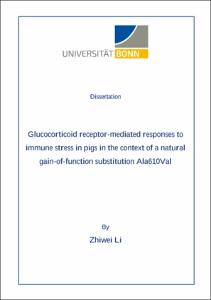Li, Zhiwei: Glucocorticoid receptor-mediated responses to immune stress in pigs in the context of a natural gain-of-function substitution Ala610Val. - Bonn, 2022. - Dissertation, Rheinische Friedrich-Wilhelms-Universität Bonn.
Online-Ausgabe in bonndoc: https://nbn-resolving.org/urn:nbn:de:hbz:5-64848
Online-Ausgabe in bonndoc: https://nbn-resolving.org/urn:nbn:de:hbz:5-64848
@phdthesis{handle:20.500.11811/9530,
urn: https://nbn-resolving.org/urn:nbn:de:hbz:5-64848,
author = {{Zhiwei Li}},
title = {Glucocorticoid receptor-mediated responses to immune stress in pigs in the context of a natural gain-of-function substitution Ala610Val},
school = {Rheinische Friedrich-Wilhelms-Universität Bonn},
year = 2022,
month = jan,
note = {Despite the importance of glucocorticoids (GCs) and glucocorticoid receptor (GR) signaling, relevant knowledge in pigs is scant as compared to humans and model animals. This study aims to investigate the regulation, function, and underlying molecular basis of GR signaling in pigs in response to lipopolysaccharide (LPS)-induced immune stress, as well as to determine the impact of GR hypersensitivity caused by a natural Ala610Val substitution in this context. In the first approach (manuscript 1), it is observed that dexamethasone (DEX), as a potent GR agonist, alters levels of several blood parameters in a natural setting, including cortisol, adrenocorticotropic hormone (ACTH), glucose, red blood cells (RBCs), and white blood cells (WBCs). Furthermore, DEX mitigates LPS-induced physiological and behavioral disorders, as manifested by improved responses of cortisol, ACTH, glucose, lactate, triglycerides, RBCs, WBCs, platelets, interleukin 6 (IL-6), panting, and cyanosis. The second part (manuscript 2) shows that: 1) alongside pro-inflammatory responses, LPS initiates an anti-inflammatory program comprising genes involved in the inhibition of NF-κB and MAPK signaling and activation of IL-10/STAT3 anti-inflammatory axis; 2) there is crosstalk between immune responses and GR signaling, which is evident in four aspects: constitutive inhibition of T cell signaling by DEX via a series of genes having no response to LPS; attenuated expression of LPS-induced inflammatory genes by DEX; diminished DEX actions by LPS paralleled by the regulation of genes implicated in cytokine and calcium signaling; and pro-inflammatory effects of DEX associated with genes related to the activation of Toll-like receptor (TLR), NF-κB, inducible nitric oxide synthase (iNOS), and IL-1 signaling. The third work package (manuscript 3) demonstrates that: 1) the GRAla610Val affects baseline levels of several parameters such as cortisol, ACTH, triglycerides, granulocytes, and platelets; 2) the GRAla610Val enhances the susceptibility of pigs to endotoxemia as evidenced by reduced feed intake and aggravated LPS-induced physiological and behavioral disorders involving blood urea nitrogen (BUN), triglycerides, platelets, IL-6, tumor necrosis factor α (TNF-α), panting, and vomiting; 3) the GRAla610Val pigs, particularly heterozygotes, are more sensitive to DEX-mediated therapy during endotoxemia, as reflected by more pronounced improvement of physiological (cortisol, ACTH, IL-6, and TNF-α) and behavioral (panting) responses in these animals. These findings will benefit the health and welfare of pigs and improve the balanced breeding and application of GC-based drugs in this species.},
url = {https://hdl.handle.net/20.500.11811/9530}
}
urn: https://nbn-resolving.org/urn:nbn:de:hbz:5-64848,
author = {{Zhiwei Li}},
title = {Glucocorticoid receptor-mediated responses to immune stress in pigs in the context of a natural gain-of-function substitution Ala610Val},
school = {Rheinische Friedrich-Wilhelms-Universität Bonn},
year = 2022,
month = jan,
note = {Despite the importance of glucocorticoids (GCs) and glucocorticoid receptor (GR) signaling, relevant knowledge in pigs is scant as compared to humans and model animals. This study aims to investigate the regulation, function, and underlying molecular basis of GR signaling in pigs in response to lipopolysaccharide (LPS)-induced immune stress, as well as to determine the impact of GR hypersensitivity caused by a natural Ala610Val substitution in this context. In the first approach (manuscript 1), it is observed that dexamethasone (DEX), as a potent GR agonist, alters levels of several blood parameters in a natural setting, including cortisol, adrenocorticotropic hormone (ACTH), glucose, red blood cells (RBCs), and white blood cells (WBCs). Furthermore, DEX mitigates LPS-induced physiological and behavioral disorders, as manifested by improved responses of cortisol, ACTH, glucose, lactate, triglycerides, RBCs, WBCs, platelets, interleukin 6 (IL-6), panting, and cyanosis. The second part (manuscript 2) shows that: 1) alongside pro-inflammatory responses, LPS initiates an anti-inflammatory program comprising genes involved in the inhibition of NF-κB and MAPK signaling and activation of IL-10/STAT3 anti-inflammatory axis; 2) there is crosstalk between immune responses and GR signaling, which is evident in four aspects: constitutive inhibition of T cell signaling by DEX via a series of genes having no response to LPS; attenuated expression of LPS-induced inflammatory genes by DEX; diminished DEX actions by LPS paralleled by the regulation of genes implicated in cytokine and calcium signaling; and pro-inflammatory effects of DEX associated with genes related to the activation of Toll-like receptor (TLR), NF-κB, inducible nitric oxide synthase (iNOS), and IL-1 signaling. The third work package (manuscript 3) demonstrates that: 1) the GRAla610Val affects baseline levels of several parameters such as cortisol, ACTH, triglycerides, granulocytes, and platelets; 2) the GRAla610Val enhances the susceptibility of pigs to endotoxemia as evidenced by reduced feed intake and aggravated LPS-induced physiological and behavioral disorders involving blood urea nitrogen (BUN), triglycerides, platelets, IL-6, tumor necrosis factor α (TNF-α), panting, and vomiting; 3) the GRAla610Val pigs, particularly heterozygotes, are more sensitive to DEX-mediated therapy during endotoxemia, as reflected by more pronounced improvement of physiological (cortisol, ACTH, IL-6, and TNF-α) and behavioral (panting) responses in these animals. These findings will benefit the health and welfare of pigs and improve the balanced breeding and application of GC-based drugs in this species.},
url = {https://hdl.handle.net/20.500.11811/9530}
}






